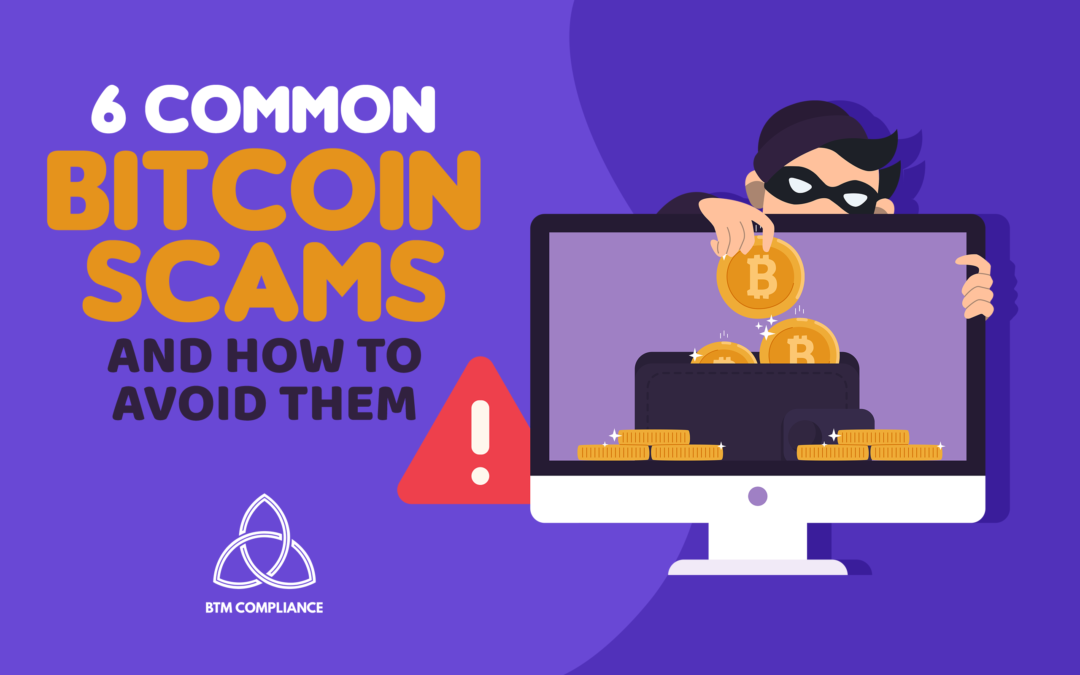Introduction
As the popularity of digital currencies like Bitcoin continues to rise, it becomes increasingly important for individuals venturing into this domain to remain vigilant about potential risks and ensure the security of their digital assets.
Recognizing Common Bitcoin Scams and How to Avoid Them
In this post, we will delve into six prevalent scams targeting Bitcoin users and provide practical tips for protecting your digital fortunes while navigating the crypto industry and its regulatory framework. Our aim is to help you avoid common cryptocurrency scams and ensure your transactions are secure.
Phishing Attacks
Phishing is a malicious online scheme in which fraudsters pose as reputable organizations to acquire confidential data. Bitcoin users, like participants in other financial markets, are often targeted by crypto scams because of the irreversible nature of cryptocurrency transactions. A study by AAG discovered that over $2.7 billion was lost in the United States in 2022 due to Business Email Compromise attacks.
To avoid phishing attacks, exercise caution with emails and messages, and always verify the legitimacy of websites before providing any personal information. Remember that phishing scams can also occur through social media, fake websites, or even SMS.
Ponzi Schemes
Ponzi schemes promise high returns by paying off earlier investors with funds from new investors. In the crypto world, these schemes often involve tokens or digital currencies. A 2020 study by CipherTrace reported that US prosecutors attempted to return $6.5 million in cryptocurrency that was taken from the victims of the “Banana Fund” crowdfunding project—an alleged Ponzi scheme.
To stay safe, be skeptical of investment opportunities promising unrealistic returns and thoroughly research the people and organizations behind any project. Additionally, be cautious of initial coin offerings (ICOs) that may be fraudulent, and look for red flags like excessive marketing, lack of transparency, or anonymous teams.
Fake Exchanges and Wallets
Scammers create counterfeit cryptocurrency exchanges and wallets to steal funds from unsuspecting users. According to a recent Forbes survey of 157 cryptocurrency exchanges, 51% of the daily Bitcoin transaction volume recorded is probably fake.
When choosing a crypto exchange or wallet, verify its legitimacy by checking for user reviews, reputable endorsements, and proper security measures. Additionally, be cautious when visiting exchange websites and ensure the URL is correct to avoid falling for a fraudulent fake website again.
Social Media and Impersonation Scams
Scammers use social media to impersonate celebrities, influencers, or even Elon Musk, promoting fraudulent giveaways and even investment scams and opportunities in the cryptocurrency space. According to a recent study, consumers reported to the FTC that $417 million in cryptocurrencies was lost due to social media fraud.
Be vigilant when engaging with profiles or promotions on social media, and always verify the authenticity of the accounts involved. Moreover, never send cryptocurrency to an unverified individual or participate in suspicious giveaways that require you to transfer funds to a bank account first.
Malware and Ransomware
Malware and ransomware are malicious software programs designed to steal, damage, or take control of a device. In the context of Bitcoin, attackers use malware to access your crypto wallet or ransomware to demand payment in cryptocurrency. In 2021, the Department of Justice recovered$56 million in a bitcoin scam investigation, and $2.3 million from the ransomware organization responsible for the Colonial Pipeline attack.
You can protect your digital assets by using reliable antivirus software, keeping your devices updated, and employing strong passwords. Furthermore, avoid clicking on suspicious links, downloading unknown attachments, and be cautious when granting apps permission to gain access to your files or devices.
Pump-and-Dump Schemes
Pump-and-dump schemes involve coordinated efforts to inflate the price of a cryptocurrency before selling it for a profit. These scams typically involve lesser-known cryptocurrencies or non-fungible tokens (NFTs) and may be orchestrated through social media or messaging platforms.
To avoid falling for these schemes, steer clear of investments based on sudden price surges or social media hype. Instead, rely on thorough research and consider the fundamentals and long-term potential of a cryptocurrency before investing.
Building a Strong Defense Against Bitcoin Scams
To protect yourself against Bitcoin scams, implement good security practices, conduct thorough research, and maintain skepticism and vigilance. Here are some more recommendations to improve your security:
- For your cryptocurrency accounts, use two-factor authentication (2FA).
- Keep your private keys and seed phrases secure, and never share them with anyone.
- Be cautious when thinking of investing in ICOs or other token sales, as these can sometimes be associated with scams (or even illegal).
- Regularly monitor the performance of your digital assets and stay informed about news and developments in the cryptocurrency industry.
How to Report Bitcoin Scams
Identify the proper agencies (such as the FBI or your local police), gather the necessary data, and submit a complaint if you become a victim of a scam. Reporting the scam can help raise awareness and prevent others from falling victim to financial fraud.
Summary
As the world of digital currencies continues to grow, so does the need for awareness and protection against scams. By understanding the common Bitcoin scams and implementing safeguards, you can better protect your digital assets and enjoy the benefits of this exciting financial landscape.
Frequently Asked Questions (FAQs)
A. Are all digital assets equally susceptible to scams?
While Bitcoin is the most targeted cryptocurrency due to its popularity, all digital assets are potentially susceptible to scams. The same security measures used to protect your Bitcoin assets should also be applied to other digital currencies.
B. How can I ensure my cryptocurrency transactions are secure in the world of virtual currency?
To ensure the security of your virtual currency transactions, between other measures you should use a reputable and secure wallet, double-check recipient addresses, enable two-factor authentication, and maintain up-to-date antivirus software on your devices.
C. What are the risks of using digital currencies for transactions, and how do they affect the global financial system?
Some risks associated with using digital currencies for transactions include price volatility, irreversible transactions, susceptibility to scams and cyber attacks, and potential regulatory challenges. These risks can also have an impact on the global financial system. To minimize these risks, stay informed, practice good security habits, and remain vigilant.
D. Can I recover my stolen digital assets, such as Bitcoin?
Unfortunately, the chances of recovering stolen digital assets like Bitcoin are slim due to the decentralized and irreversible nature of cryptocurrency transactions. Bitcoin wallet addresses are not connected to any government ID or physical address, so its often impossible to locate the person behind the wallet. However, reporting the theft or cryptocurrency scam to the appropriate authorities may aid in tracking down the perpetrators and potentially recover some of the stolen funds.
Conclusion
In conclusion, as Bitcoin and other digital currencies continue to grow in popularity, it’s crucial to understand the potential dangers and take proactive steps to safeguard your digital assets. By staying informed about common crypto scams, employing strong security measures, and remaining vigilant in your online interactions, you can confidently navigate the exciting world of cryptocurrencies and protect your crypto fortunes.
With this comprehensive guide to common Bitcoin scams and their prevention, you’ll be well-equipped to keep your digital assets secure and avoid falling victim to extortion scams from nefarious actors in the cryptocurrency space. Stay safe, always do your research, and happy trading!


